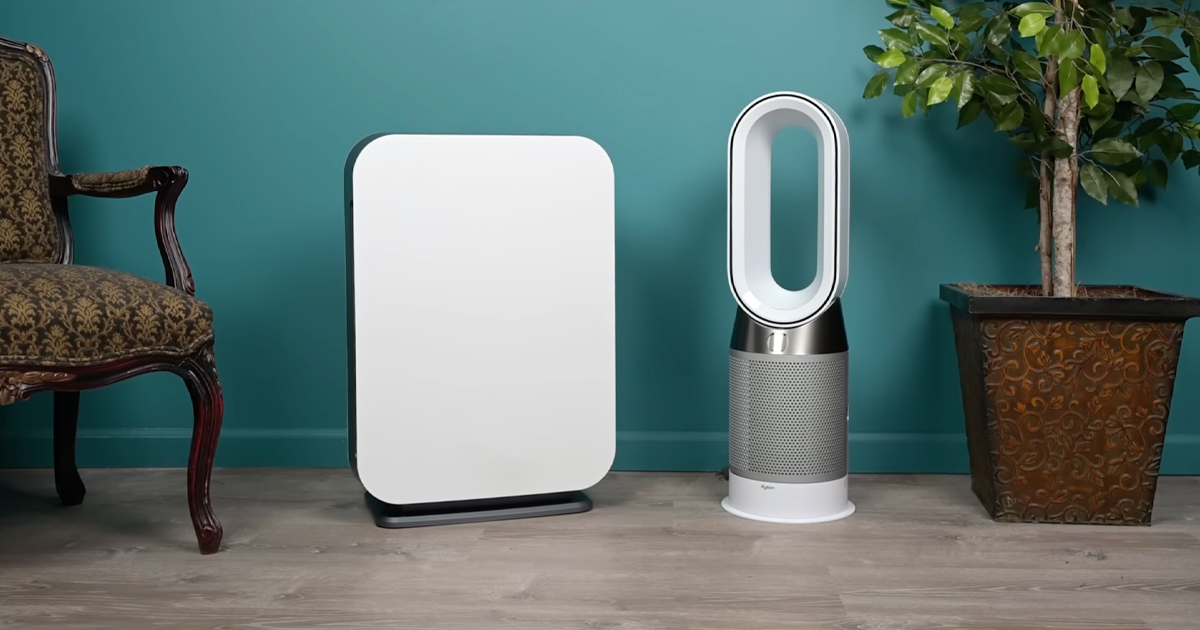Welcome to the latest installment of our air purifier wars series. This comparison is of two ultra-premium, highly-rated air purifiers: the Dyson Pure Hot+Cool HP04 and the Alen BreatheSmart 75i. We put both of these air purifiers through a full series of tests over the past several weeks, and the results were really interesting. So, let’s get started.
Dyson Hot+Cool HP04 vs Alen BreatheSmart 75i
First, the basics. These two air purifiers are in the same price range, and both are designed to work in large rooms. They also share the same basic air purification techniques, using HEPA filters to catch particulates and carbon filters to eliminate smells, gases, and volatile organic compounds or VOCs.
Alen BreathSmart 75i
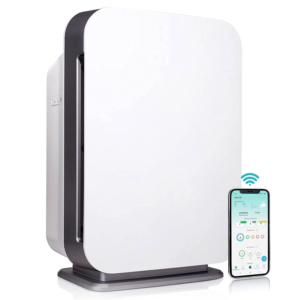
Dyson Pure Hot+Cool HP04
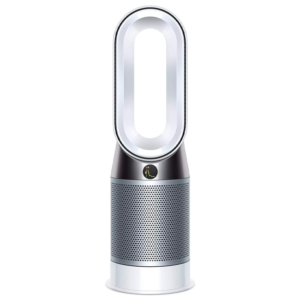
Features
The first category we’ll look at is features. These are things that don’t necessarily help with air purification but are nice to have. Both have a built-in particle sensor, meaning that they can detect how dirty your air is at any given time. This air quality detection makes possible other useful features like air quality indicators that change color depending on how dirty the air is, a feature which they both have.
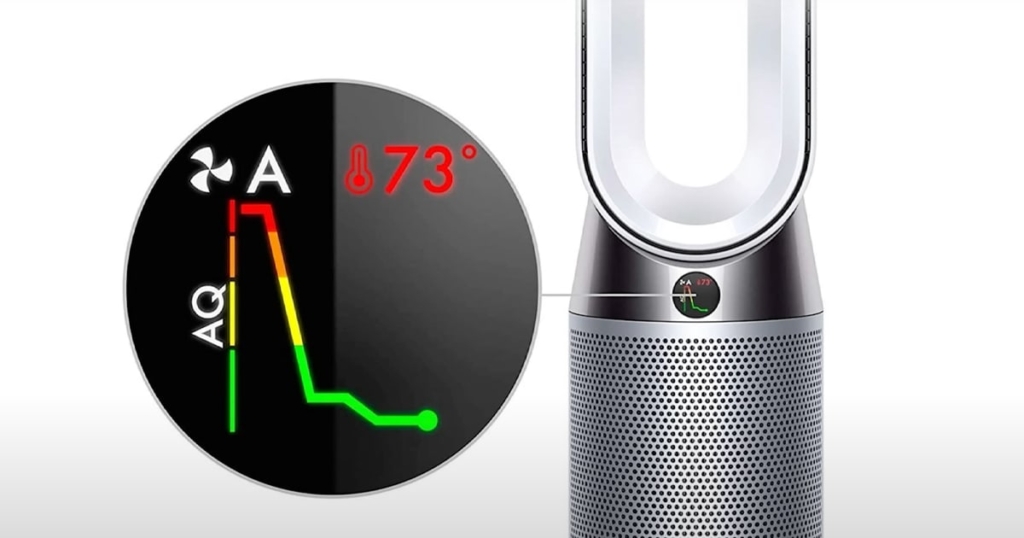
But the Dyson goes a step further with this as it has a digital graph display that changes in real time depending on the air quality, as well as various alerts that will pop up if one of its many sensors detects something off with the air quality, a feature we’ve only seen with Dyson air purifiers so far. Another very useful and rare feature that they both have is an app that provides air quality data history.
We recently compared the IQAir HealthPro Plus vs Greentech pureAir Active HEPA+ Pro. See which air purifier came out on top!
After cooking, having a party, or vacuuming, you can go to their app and find out how your air quality was impacted, how it was corrected, and how long it took to do so. Though, here again, the Dyson goes a step further since it has VOC data history and particle detection history, whereas the Alen only has particle history as it does not have any kind of VOC detection on board.
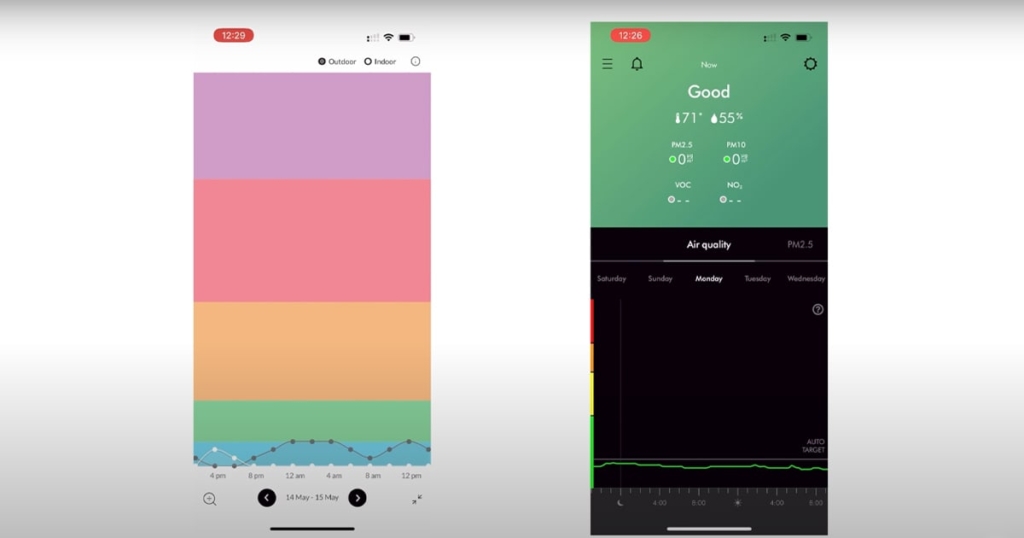
If automatic controls aren’t your thing, both models also have multiple fan speeds and timers that you can set from the unit or from their app. The Dyson even has a physical remote control.
Differences in Features
Moving on to some differences in their features. The most notable thing is probably that the Dyson HP04, in addition to being an air purifier and a room fan, is also a space heater. This is a pretty big value-add, and it’s something that almost no other air purifier does. We tested this heating function against a standard 1500 watt space heater and found that the space heater was consistently about 25 degrees hotter on max power than the Dyson.
So, if you’re wondering if the Dyson HP04 is better than a typical space heater, the answer is probably no, but it’s certainly better than the Alen, which doesn’t have a heater at all. Dyson also has what they call “Air Multiplier Technology” with 350-degree oscillation with its fan, which you can adjust in many different ways in the app. Dyson also points out that by projecting the air with its fan, it actually circulates the air in the room better for the air purifier to process, which is probably true.
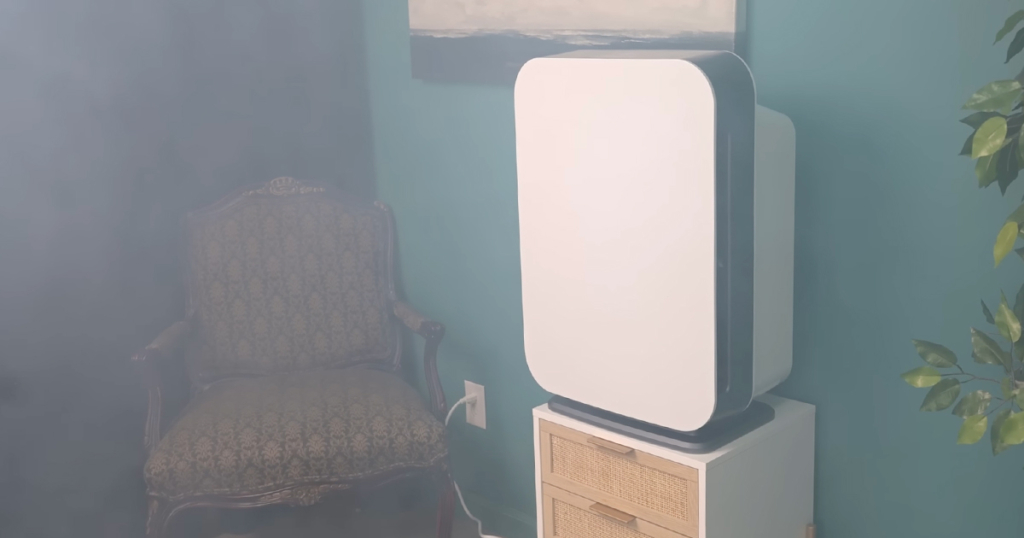
The Dyson will also detect nitrogen dioxide and formaldehyde, which is the first time we’ve seen either of those sensors on an air purifier. Unlike the Dyson, the Alen has a built-in ionizer, which they call an “ozone-safe ionizer“. This is an electrical device that emits positive and negative charges into the air, causing particles to stick together and become larger. According to the manufacturer, this allows the Alen to catch a larger number of airborne particles more easily.
So, while they both have top-of-the-line features, the Dyson HP04 has the highest feature score we’ve ever seen—double the score of the Alen 75i. Hence, the Dyson definitely wins this category.
| Alen BreatheSmart 75i | Dyson Pure Hot+Cool HP04 | |
|---|---|---|
| Air Quality Indicator | Yes | Yes |
| PM2.5 Particle Sensor | Yes | Yes |
| HEPA Filter | Yes | Yes |
| HEPA Filter Rating | 99.99% 0.1 microns | 99.97 0.3 microns |
| Activated Carbon Filter | Yes | Yes |
| Ionizer | Yes | No |
| App | Yes | Yes |
| Air Quality History | Yes | Yes |
| VOC Data History | No | Yes |
| Fan Speed Settings | 5 | 10 |
| Timer | Yes | Yes |
| Heater | No | Yes |
| Nitrogen Dioxide Detection | No | Yes |
| Formaldehyde Detection | No | Yes |
| Where to Buy | Amazon | Amazon |
Filter Quality
The next round is filter quality. When it comes to air purifiers, the more filter media, the better. Both have HEPA filters, but the Alen has more HEPA filter material than the Dyson, meaning that you would need to replace the Alen filters less often than the Dyson.
HEPA Filtration
The Alen HEPA filters do cost about a third more than the Dyson filters, so it more or less evens out. The Dyson filters have a filtration rating of 0.3 microns, which is the industry standard. The Alen, however, takes it up a notch with a rating of 0.1 microns on its HEPA material.
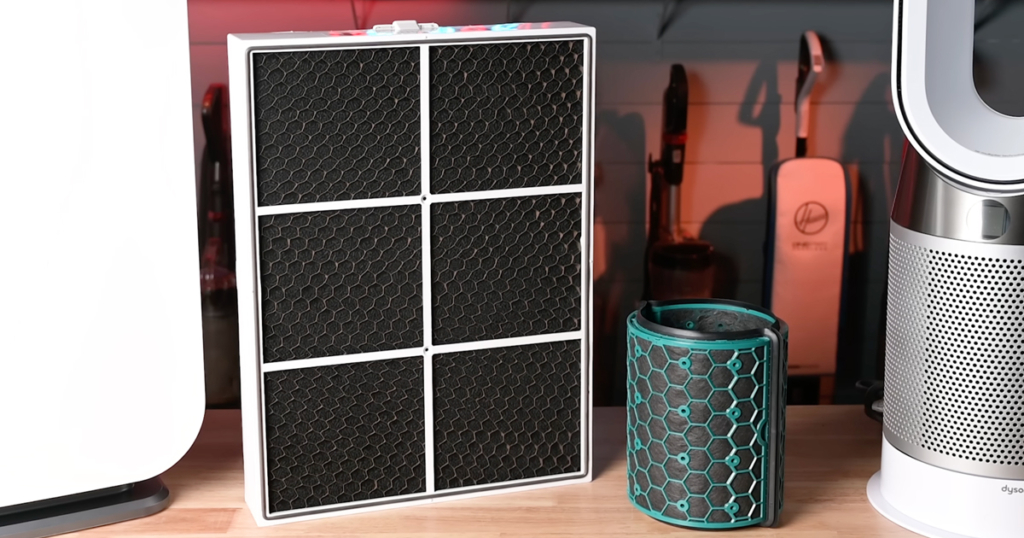
Activated Carbon Filters
They both have activated carbon filters. These are the filters that catch gases, odors, and volatile organic compounds. And while they both use high-quality charcoal in their filters, in terms of quantity, the Alen has much more of it. Though it’s not the most we’ve ever seen, it’s pretty close, and it will definitely help the Alen in the VOC tests later on.
So, in the filter quality category, the Alen did significantly better than the Dyson and gained some ground back here.
Airflow
Next, we have the bench tests where we measure their airflow and noise levels. Testing both air purifiers at max power, the Dyson seemed to process air faster. This may be due to the differences in the amount of HEPA or carbon material, which we touched upon earlier, where their air is slowed down slightly by having more filter media.
Noise Level
When looking at the noise levels, which is very important with air purifiers, the Alen, even at max power, stayed at a comfortable noise level, which we measured at 52 decibels. The Dyson reaches that noise level when it’s set to its middle setting, but we measured that setting to have reduced airflow. So, there is some give and take there.
It basically ended up being a tie in the bench test category, so it looks like it’s all going to come down to the particle and VOC tests.
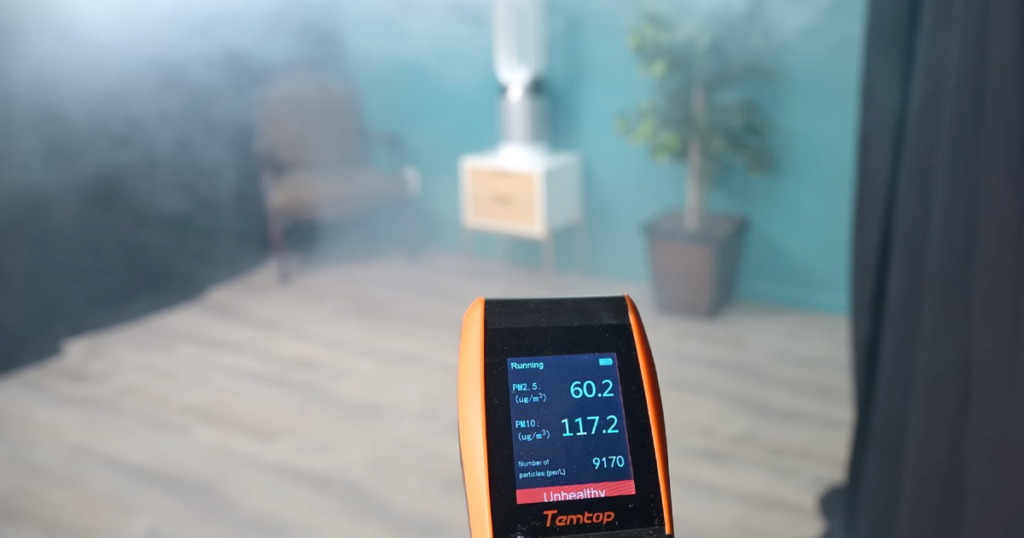
Particle and VOC Tests
The first particle test we do is a fog test, where we release 12 seconds of fog into a ventless room and run the air purifiers on max power. In this test, both air purifiers did well, reducing the 10 and 2.5 micron particles to the same low levels. But the Dyson was faster, reducing the particles at a rate of 32 particles per minute compared to 23 particles per minute on the Alen.
Next, we tested their reduction of volatile organic compounds. We test this by pumping exact amounts of incense smoke into a sealed refrigerator and measuring how much and how quickly the air purifiers can reduce the VOCs in a five-minute test on max power. Here, both air purifiers successfully reduced VOCs all the way back down to the test baseline, which hasn’t been the case for all the air purifiers we’ve tested so far.
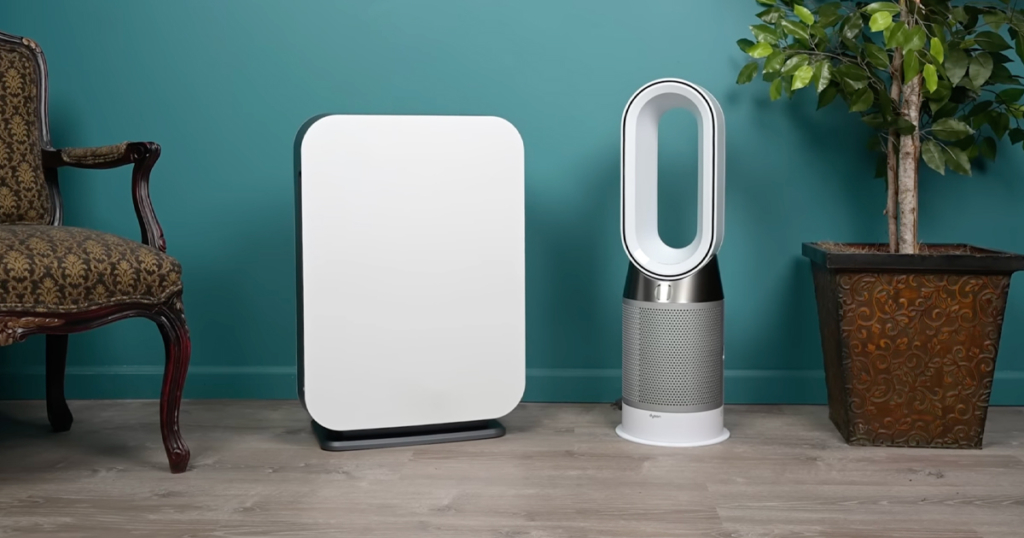
However, if we take speed into account, the Alen outperformed the Dyson, and by a significant margin. For example, it took 4.8 minutes for the Dyson to reduce the VOCs 100 percent, where it took the Alen less than half that time at only 1.85 minutes, with similar numbers on the formaldehyde reduction.
So, that large amount of charcoal really paid off for the Alen in the VOC tests. It got a higher score than the Dyson in the filtration test category overall.
Dyson Pure Hot+Cool HP04

Alen BreatheSmart 75i

Our Conclusions
But in the end, the better filters and better filtration on the Alen were not able to overcome the massive amount of features and extras on the Dyson HP04. And, at least in our scoring system, the Dyson edged out the Alen in the final score.
However, it’s clear that both of these air purifiers are of the highest quality, and either one is a great buy that you can be proud to own.
Test Results
| Alen BreatheSmart 75i | Dyson Pure Hot+Cool HP04 | |
|---|---|---|
| HEPA Filter Size | 565.5 cu. in. | 161 cu. in. |
| Airflow (Max) | 48 CFM | 54 CFM |
| CFM to dB | 0.75 | 0.55 |
| Particles Reduced/min | 22.9 (avg PM10 & 2.5) | 31.9 (avg PM10 & 2.5) |
| 100% VOC Reduction | 1.85 min. | 4.8 min. |
| 100% HCHO Reduction | 1.8 min. | 3.1 min. |
| Buy | Amazon | Amazon |
